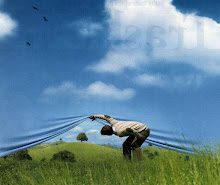\dyp-NOS-uh-fist\, noun:
Someone who is skilled in table talk.
~~~~~~~
I've noted before that the internet is the last true democratic forum, but I've begun to think lately that maybe it's the only successful one. Ever.
Consider this: even newspapers, film, television and radio reach a certain audience. And if they do manage to be proliferated across the globe, it's through mediums that more than likely have some say in what they are proliferating. So whether the range is too small, or the censorship too big, the common person has, in some way or another, their voice restricted.
The internet does away with these boundaries completely (so long as the person can access it). Sure, it does not offer each and every person instant fame, nor worldwide viewership--but it does exactly what a democratic system should: give each and every person a place where their voice can be heard. People is Japan may not care about my opinion. But if they want to, it's available to them.
Democracy thrives not only on information, but free opinion. Only in perusing the opinions of others can we evolve our own, and truly communicate with one another. One of the great things about the internet is that, save the language barrier, it is not locally exclusive. It connects the entire world in a democratic forum, even if the country is not a democracy! (This is, of course, exempting those countries that have already recognized the power of the internet and are stifling it).
This is why I say the internet is the only successful democratic forum ever (but hopefully only the first). It is a chance for not only the opinions, but the personalities, lives and true interpersonal communication between people to suffer no filters. Once the internet is so cheap it is readily accessible to a large majority of the globe, we have found a place where democracy thrives for the first time, and perhaps it will actually teach us how democracy is supposed to function in the first place.
Now, there are several corporations who want a hand in censoring the internet. Allowing internet providers to put blockers on our information would ruin this so incredibly perfectly free-form system that we have now. It would undo all of the things I just said, and reduce the internet to the effectiveness of the rest of media. This cannot be allowed to happen. Even if one doesn't like the opinions on the internet, stifling them will crush the gift the internet brings: true mental human autonomy. And without that, we have nothing.
Thursday, November 22, 2007
Subscribe to:
Post Comments (Atom)

4 comments:
Are you a deipnosophist? I imagine that you are.
Not particularly, haha. Classrooms are more conducive to coaxing my introverted side into submission if the subject is particular engaging, but I often seep back into an introverted and socially awkward mode of operation thereafter. It depends on the table, really, to describe me as a deipnosophist or not.
I see. You more than make up for any public introversion with thoughtful, often aesthetically pleasing prose.
Thank you, I appreciate the compliment.
Post a Comment